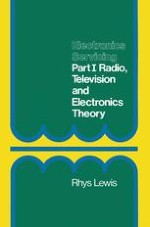
1981 | OriginalPaper | Chapter
Electrical supplies
Author : Rhys Lewis, B.Sc.Tech., C.Eng., M.I.E.E.
Published in: Electronics Servicing
Publisher: Macmillan Education UK
Included in: Professional Book Archive
Activate our intelligent search to find suitable subject content or patents.
Select sections of text to find matching patents with Artificial Intelligence. powered by
Select sections of text to find additional relevant content using AI-assisted search. powered by
Energy is defined as the ability to do work. There are many different kinds of energy—mechanical, electrical, chemical, heat and nuclear energy as well as electromagnetic energy and the energy of sound (which is a form of mechanical energy). All electronic systems in order to work must have a source of energy, in particular, electrical energy. Isaac Newton, the seventeenth-century English physicist, suggested that there is a fixed amount of energy available in the universe of different kinds which can be converted from one kind to another but never destroyed. Earlier this century Albert Einstein showed that energy can in fact be obtained from mass, a fact shown convincingly in nuclear reactions, which are the basis of electricity generation in nuclear power stations and, of course, nuclear bombs. Energy conversion is taking place all around us all the time. In the internal combustion engine the chemical energy of petrol is converted to the mechanical energy of movement of the car, in the electrical generator mechanical energy of whatever drives the generator is turned into electrical energy (see chapter 4) and in the electric fire or the electric lamp (the incandescent type) electrical energy is converted to heat or light respectively. In the case of the lamp both heat and light energy is available since the lamp gets warm.